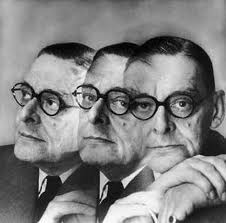T.S. Eliot was one of the great English poets of the twentieth century. Born in St. Louis, at age 25 in 1914 he moved to London, and fourteen years later became a naturalized British citizen. One could call him a Trans-Atlantic author. He was best known for poems like The Love Song of J. Alfred Prufrock, or The Wastelands, but he also won awards for prose such as his ‘Murder in the Cathedral’ and of course the musical ‘Cats’ is based on some of his poetry. He was also a very keen observer of culture, and he often made observations that proved very prescient in various ways. I came across one such in a lecture he gave in 1947 entitled ‘What is a Classic?’ Here is what he said in an age before the personal computer.
When knowledge of a limited and specific sort coming from a particular area of expertise is “applied to the whole of human experience; [it] confounds the contingent with the essential, the ephemeral with the permanent. In our age, when men are prone to confuse wisdom with knowledge, and knowledge with information, and to try and solve the problems of life, in terms of engineering [or technology], there is coming into existence a new kind of provincialism, not of space, but of time; one for which history is merely the chronicle of human devices which have served their time and have been scrapped, one for which the world is solely the property of the living, a property in which the dead hold no shares. The menace of this kind of provincialism is, that we can all, all the peoples of the globe, be provincials together; and those not content to be provincials can only become hermits.”
We have all met the technophobes in our world of technophiles and have seen what disadvantages they suffer from not going with the flow. The danger of course is that when ‘know how’ replaces other kinds of knowledge and wisdom, we assume technology can solve most of our problems in life, when alas, this is far from true. We cannot solve our loneliness problem by simply friending more people on Facebook. We have to actually have personal relationships of good quality and enduring quantity.
The danger in our age is assuming that just because we can access more information quicker, and manipulate it with greater ease, this will simply our life and make it less stressful. This too is a utopian myth. In 1984, I did not have 100 emails a day to deal with. There was also seldom any urgency to respond to letters I received in the post. The faster the technology the more the pressure to respond quickly etc. or appear to be a Luddite. I had yet another person write me yesterday an email asking me to look at his new self-published work. When I did not respond immediately, he sent me another email today, rather more peevish in tone. And so it goes.
Let me be clear that technology has its good uses. But we are deluding ourselves if we think it will solve our health, relational, financial, much less our spiritual problems. It will not. These sorts of problems have no disappeared in the last forty years since the rise of the personal computer and its devices. If anything they have gotten worse.
Indeed, technology can even get in the way of such solutions to our problems as we may think because of all the info online that we have access to that we can be our own doctors, our own lawyers, our own spiritual counselors and so on. In fact this is not so, because we do not have the expertise to critically analyze the medical data or the personal data, and further more we do not have the proper distance from ourselves and our situation to be objective about it anyway. We need outside, expert guidance. Period.
The most severe problem Eliot is pointing to is in the age of instant obsolescence we assume that the latest must be the greatest and the newest must be the truest. In other words, we assume the past is just prologue, and its not a prologue we need to keep referring to. That is, we lose our sense of history, or proportion, of the importance of the fact that we stand on the shoulders of those who have gone before us. And so we become provincial and parochial, assuming obviously that because we in some ways know more than previous generations, we also know better. As Porgy once said ‘It ain’t necessarily so’. Think on these things.













